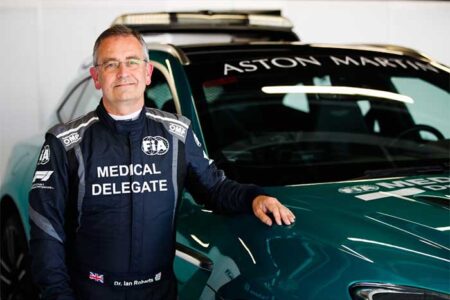When the drivers take to the track this Abu Dhabi Grand Prix weekend, Dr. Ian Roberts will be keeping a close eye on all the action as he is the man tasked with the all-important call of providing a swift response in case of an accident.
As the FIA’s Chief Medical Officer and Medical Delegate for F1, Dr. Roberts has enormous responsibilities, helping to ensure the drivers receive the fastest support on track while overseeing the circuit’s on-track medical procedures.
While the series of practice sessions, qualifying and race will be among his main priorities, preparation for race week is key, which starts with discussions with the local chief medical officer and team.
“I keep an overwatch on the medical safety plan from the local chief medical officer, and that happens several months before the event. Upon arrival at the venue, I then look at the medical centre and check that all is in order,” explains Roberts, who used to work in anaesthesiology.
“After liaising with the local chief medical officer on the deployment of their resources, we then go through a medical incident simulation, where we set up a mock casualty and mock incident on track and assess the medical team’s response to it.
“Additionally, we also run a medical intervention exercise, where we test the logistics of a real-time deployment of resources by Race Control. Once we’ve checked that all of those measures are in place, we then wait until the racing begins.”
During each on-track session, his role also includes being part of the medical car team with the vehicle widely seen at the back of the grid of each F1 race – a position he has been involved in since 2013.
While he cherishes being part of a team that delivers a safe and enjoyed sporting event, Dr. Roberts has seen first-hand the impact incidents can have on motorsport drivers during his career. “The most high-profile incident was the Romain Grosjean incident in Bahrain,” he said. “But, let’s not forget the tragic events of Japan and Spa when Jules Bianchi and Anthoine Hubert, respectively, lost their lives, and where the safety of the engineering was overwhelmed by the enormity of the impacts.
“Those events will always stay with me, they made the headlines. But most of the time, we’ve been quietly ensuring that the medical teams are ready and can respond effectively when they’re required.”
Reflecting on the qualities needed to do his demanding, high-pressure job, he says: “It’s important to stay calm and be very objective about what you’re finding on the track. I also think being adaptable is vital, as well as being able to make decisions very quickly. It’s all well and good taking time to analyse every angle over an hour after the incident. But sometimes things happen on track and decisions have to be made within seconds.”
For those with aspirations to follow in his career footsteps, Roberts advises them to get involved in any level of motorsport competition and learn from each experience.
“I’m often asked how someone should get into Formula One and my reply is to get involved in motorsport first and see how you like it,” he said. “It may not be for you but get involved trackside or at a rally stage in the cold and the rain for the weekend. If you like it, you should go back for more.”
